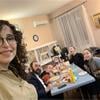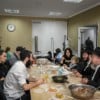The holiday of Shavuot marks the giving of the Torah at Mount Sinai, the moment that the Jewish people came to be. Two long-standing traditions have come to characterize the celebration of this momentous event: involving children and enjoying dairy foods. In Ukraine, despite more than three years of devastating war, Jewish communities across the country are preparing to celebrate with those same focuses—bringing joy to children and continuing the beloved custom of dairy delights.
Both practices are deeply rooted in the meaning of the day. The Midrash teaches that when the Jewish people prepared to receive the Torah, G‑d asked for guarantors who would uphold it. Only when they declared, “Our children will be our guarantors,” was the offer accepted. In light of this, the Rebbe—Rabbi Menachem M. Schneerson, of righteous memory—encouraged every Jew, even the youngest child, to be present at the reading of the Ten Commandments on Shavuot. As the Jewish nation re-experiences the giving of the Torah, it is only fitting that the guarantors be present.
The dairy foods traditionally enjoyed on Shavuot are also linked to the giving of the Torah, with various explanations offered by the Sages throughout the generations to highlight their significance.
For Jewish communities in Ukraine, every day brings new challenges, but these two aspects of Shavuot can be especially difficult. With bombs and exploding drones wreaking havoc, children are often the most vulnerable. And with supply chains disrupted or destroyed, accessing fresh dairy products across the country becomes an added obstacle.
Still, the Jewish people are not known for giving up in the face of adversity. Across Ukraine, communities are determined to celebrate the holiday in a manner as close to “normal” as possible.

In the storied port city of Odessa, Rabbi Avraham and Chaya Wolff—who’ve directed Chabad-Lubavitch of Odessa since 1992—are making extensive arrangements to ensure the entire community has the opportunity to celebrate the holiday.
“Despite the ongoing war and the many hardships, our Jewish community—Chabad Odessa—remains united, resilient and deeply committed to keeping the light of Torah alive, especially as we approach the beautiful holiday of Shavuot,” says Igor Shatkhin, president of the Federation of Jewish Communities of Southern Ukraine and director of development for the Mishpacha Children’s Home in Odessa.
The holiday, which will begin at sunset on June 1, 2025 and goes until nightfall on June 3, 2025, will be celebrated in no fewer than three different synagogues across the city to ensure that as many people as possible, regardless of where they live or their level of mobility, can join in the joy of receiving the Torah. Plans are also underway for festive dairy meals featuring traditional holiday delicacies. “We expect many people to come hear the reading of the Ten Commandments on the first day and take part in the Yizkor service the next day,” Shatkhin adds.
Children, of course, are not being left out. In the community’s Jewish schools and kindergarten, children are learning about the meaning of Shavuot and preparing songs, skits and decorations to celebrate with joy, despite the darkness brought on by the war.

At the Mishpacha Children’s Home in Odessa, which houses children from birth to 18 years old from across Ukraine who have been orphaned or displaced, the excitement is building with the children counting down the days to the holiday. And at its sister organization, the Mishpacha Nursing Home, the spirit of Shavuot will come alive with special meals, visits from students, children and volunteers, and Torah readings that foster a sense of family and belonging.
“Our staff are working around the clock to give them not only safety and structure, but also warmth, education and holiday experiences that nourish their souls,” says Shatkhin.
As for the traditional dairy foods, the Odessa community, like Jewish communities across Ukraine, is fully stocked, thanks to the efforts of Chabad’s Jewish Relief Network Ukraine (JRNU). Since the beginning of the war, JRNU has been at the forefront of humanitarian aid for Ukrainian Jews. In preparation for Shavuot, the organization coordinated a large-scale logistical operation to produce dairy products at local facilities under strict kosher supervision.
Once production was complete, refrigerated trucks were dispatched across the country, packed with kosher delicacies such as ice cream, yogurt, hard and soft cheeses, cream cheese and specially made individual ice-cream treats for children who come to hear the Ten Commandments.

‘We Focus on Joy, Hope, Learning and Connection’
Rabbi Yehoshua Vishedski, head of the “UKR-Kosher” supervision agency, notes that the dairy production nowadays comes with unique challenges. “We only resumed kosher dairy production last year, and thank G‑d, we’ve been able to expand the offerings over time, including several products made especially for Shavuot.”
Alongside the material preparations, JRNU is also helping rabbis and their communities focus on the spiritual essence of Shavuot. A digital campaign, beautifully designed booklets and other resources are being distributed to encourage every Jewish family to bring their children to hear the Ten Commandments.
“Yes, the challenges are many—there are sirens, missile attacks, drones every night. Constant uncertainty,” says Shatkhin. “But we do everything we can to shield our community, especially the children and the elderly, from fear and hardship. We focus on joy, hope, learning and connection.”
“Above all,” he concludes, “we strive to welcome every person who walks through our doors and remind them that despite what’s happening outside, there is Torah—and the unshakable warmth of community.”









Start a Discussion